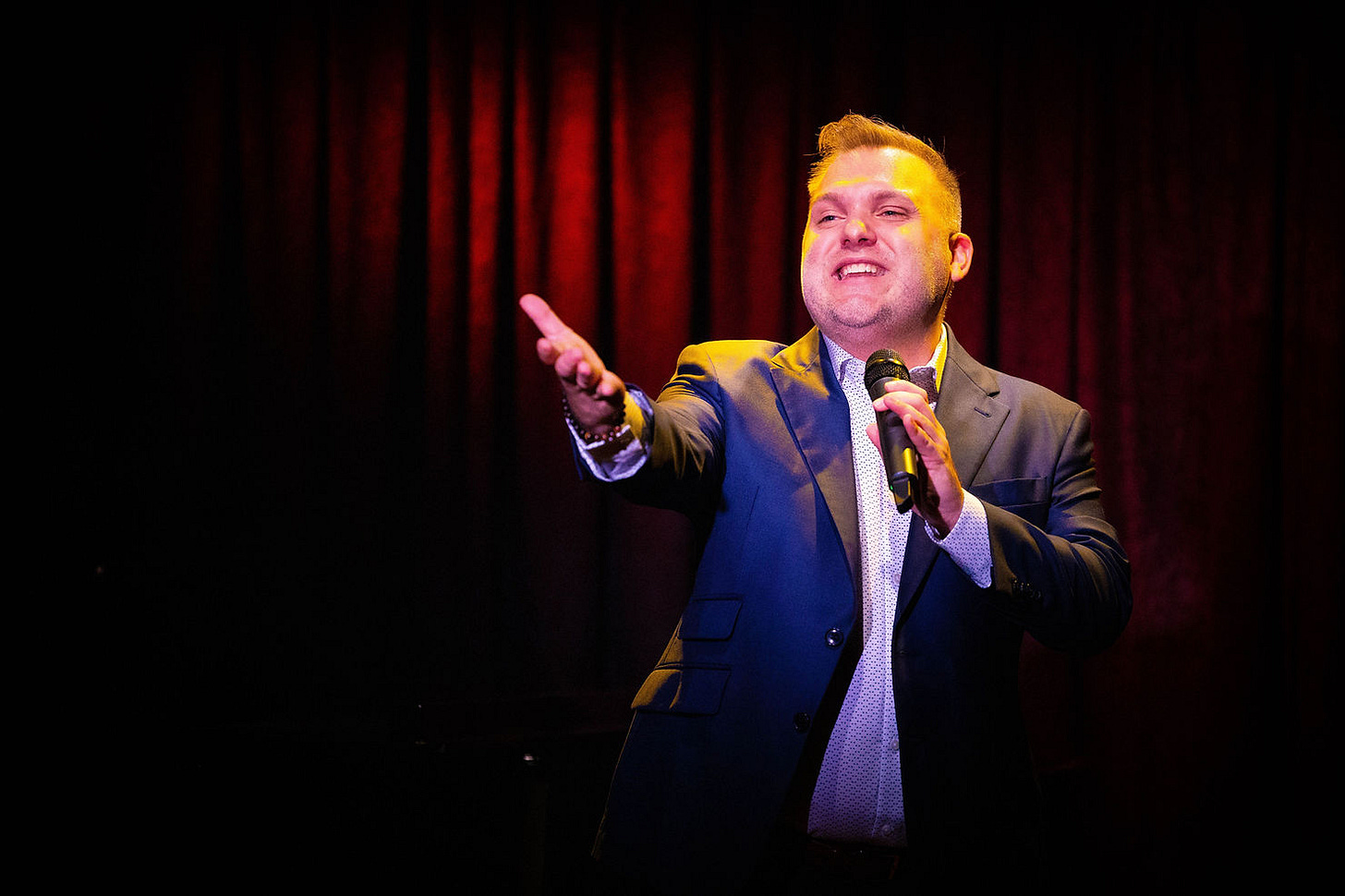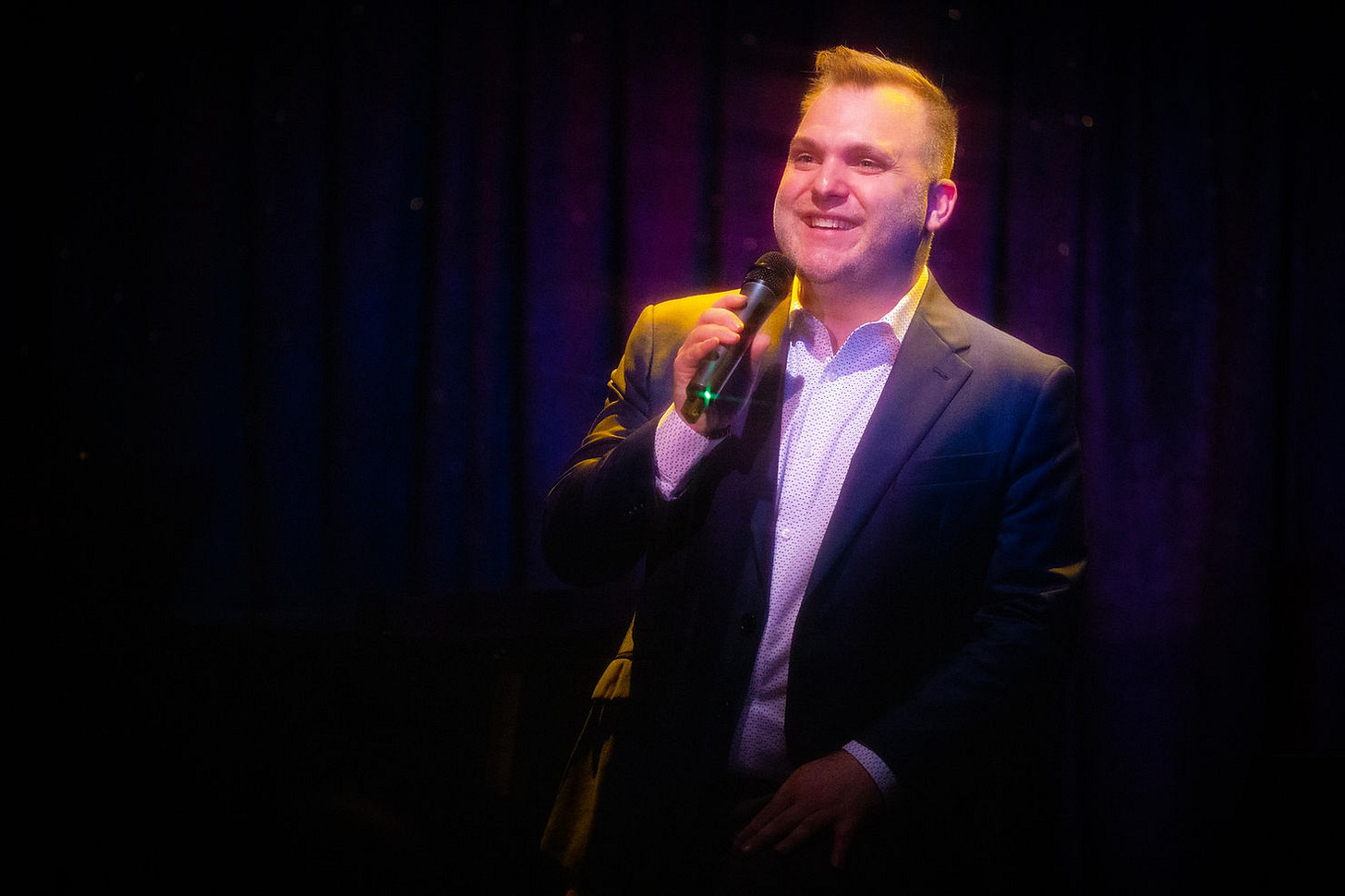CABARET REVIEW: Down a Yellow Brick Road-The Music of Judy Garland.
Go into the world of cabaret for a fabulous evening of Judy Garland music and celebration of being queer. Tyler Houchins is a cabaret star!
A Celebration of a Queer Icon in Philly.
Written for Queer Reviewed by Ben Deane-Schierloh
Walking into Rosy’s Taco Bar East, located in the bustling Queen’s Village neighborhood of Philadelphia, I’m both curious and intrigued to see how a location like this will work for the event I’m planning to see this evening: a one-man cabaret show entitled Down a Yellow Brick Road: The Music of Judy Garland.
As I make my way upstairs, I grab a seat at the bar with a friend, as my eyes look upon an admittedly unusual (but welcome) sight at an establishment like this: a raised stage, complete with prominent proscenium, lounge chairs, a lone microphone on a stand, and a keyboard. Suddenly, I’m enticed and excited for the evening to come: live performance and delicious tacos and margaritas together in the same room? Count me on board.
Still, there’s a little trepidation from me as I sit there and begin to ponder: how will such an intimate space help or hinder this performer? Thankfully, I need not worry, as soon enough the star of tonight’s performance walks in and immediately the tone of the evening is set, and the audience knows we’re in safe hands.
It was a fantastic showcase of why Judy Garland became (and remains) such an icon for the queer community
Tyler Houchins is no stranger to the Philadelphia theater world, and here displays a raw and moving evening of songs set to the music of a fierce woman who inspired him greatly, the incomparable Judy Garland. Down a Yellow Brick Road… is here in Philadelphia after three successful New York engagements, and it’s easy to understand why. From the second they enter the room, Tyler’s warmness and energy becomes infectious, inviting the audience in on the journey with him.
As soon as he sings, a few things become readily apparent. Houchins possesses a masterful control of his voice with this repertoire, with perfect rounded vowels and powerful straight tones, contrasted with a strong vibrato that evokes, but never imitates, that of Broadway divas long passed. My favorite tunes of the night required Houchins to use his head voice, an absolutely stunning mix of high pitches and gentle wobbling vibrato that added a soaring elegance to his vocals. Especially impressive was his vocal ability to flip into head voice from his beltier chest vocals, a skill which never stopped to delight my ears.
Additionally, while this genre of music is so pleasingly “simple” to the ears melodically, it should be noted that on a technical level, it is anything but. Tight melodic lines and accidentals, combined with utilization of the full vocal range, while often unsupported by accompaniment for brief intervals…all obstacles which Houchins is able to navigate through with seeming ease, despite the songs’ deceptive difficulty.
Special kudos must be given to the setup: a single accompanist and an elegantly stripped back sound mix, that chose not to rely on strong reverb for added presence in the voice, made the star of the show (and the force of his vocals) a natural highlight of the aural landscape. The accompanist here, Mark Hartman, is a perfect fit for Houchins, effortlessly supporting him on the keys, vamping music between songs to underscore Tyler’s dialogue, and even offering up harmonies to complement the song.
While the vocals alone would be worth the night out, Houchins has structured this show in a way that lets him weave the music of Garland through a story of his own upbringing in the South, his own journey of discovering queerness, and highlighting the power of community. Houchins’ ability to tell stories is astounding, building empathy with his audience through raw honesty and vulnerability, but keeping them entertained with humor and lightness throughout.
The songs chosen here were tied very well into the overall narrative. Particular favorites of mine included “The Boy Next Door” and “Too Late Now,” with the former in particular capturing such a sense of longing made all the more gut-wrenching through Houchins’ vocal flips into a softer resonant head voice. If I had to find an issue with one piece of the cabaret, it would be minor, but I found that the only song that didn’t necessarily fit was “Purple People Eater,” as it’s an odd song (by design). The crowd seemed to love it, however.
The evening wrapped up with a wrenching and raw anecdote that revolved around Houchins’ reaction and response to the Pulse nightclub massacre of 2016, in which a gunman entered Pulse (a gay club in Orlando) and murdered civilians. Reeling from that news, Houchins gravitated to the local Philadelphia gayborhood, and saw the strength of the queer community coming together and mourning in solidarity, with strangers comforting one another due to that shared sense of community. This touching tale dovetailed into possibly my favorite rendition of “Somewhere Over the Rainbow” I’ve ever heard: a slower, more intentional version that reflected a sense of hope against overwhelming trials and odds. Combined with the preceding story, it was a fantastic showcase of why Judy Garland became (and remains) such an icon for the queer community, and I commend Houchins on the smart application of that most famous tune here.
A celebration of queerness, of old movies and musical theater divas, and of the endearing musical legacy of one of Hollywood’s greatest vocalists, Down a Yellow Brick Road: The Music of Judy Garland proves to be a fun and engaging cabaret, headlined by a smart and talented leading star with a passion for honoring her legacy.





